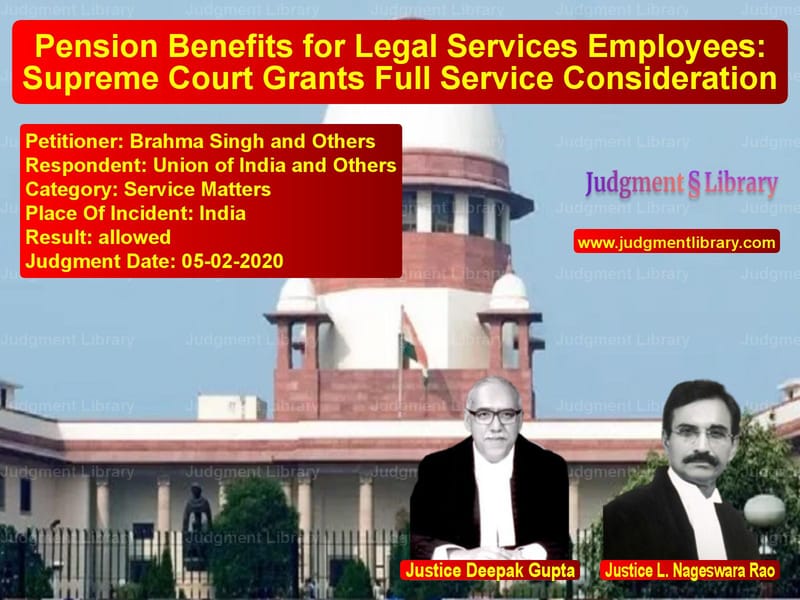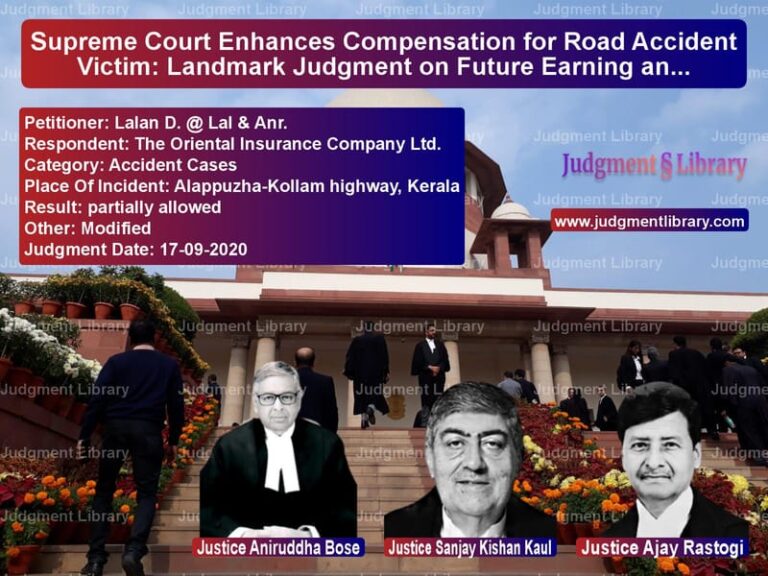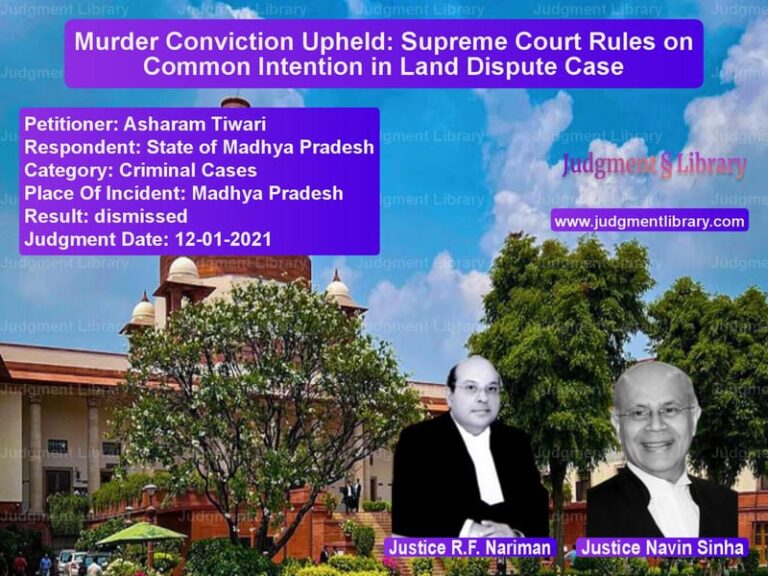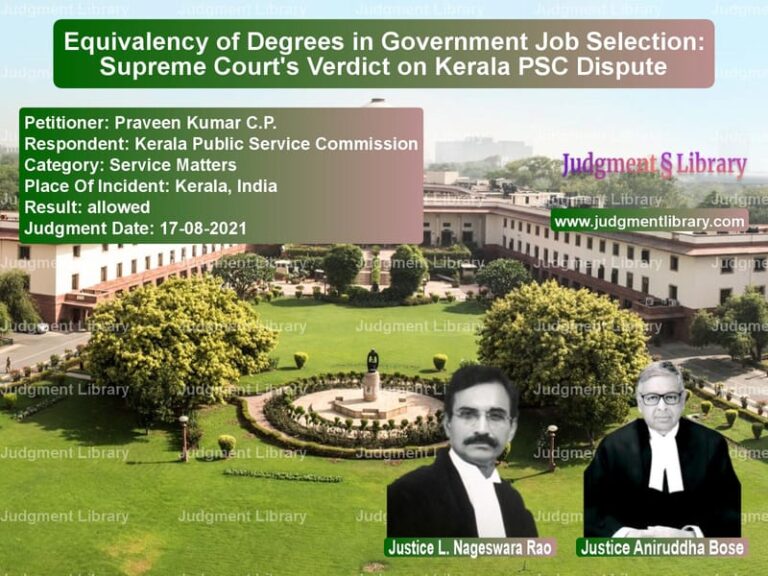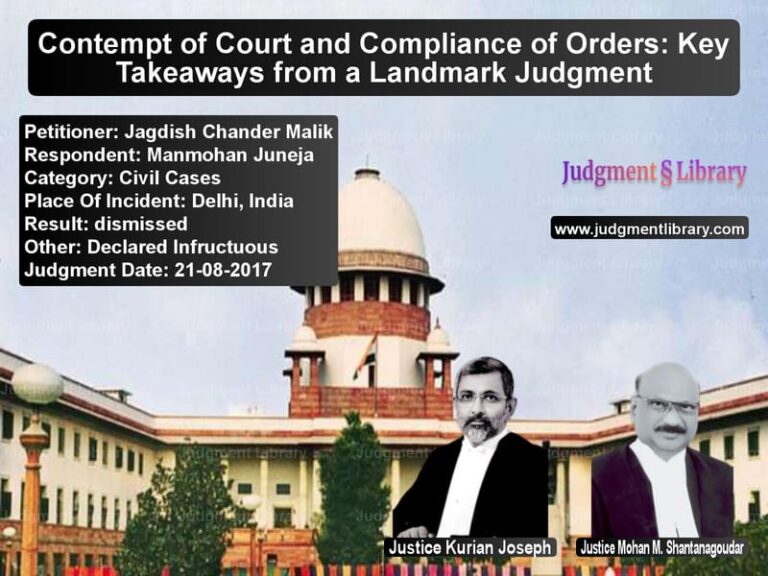Pension Benefits for Legal Services Employees: Supreme Court Grants Full Service Consideration
The Supreme Court of India, in its judgment dated 05 February 2020, ruled on the entitlement of employees of the Supreme Court Legal Aid Committee and the Supreme Court Legal Services Committee to have their full tenure counted for pension and retirement benefits. The case involved a dispute regarding whether the service rendered by employees before the promulgation of the Supreme Court Legal Services Committee Rules, 2000, should be counted as qualifying service for pension determination.
Background of the Case
The petitioners, who are current and retired employees of the Supreme Court Legal Services Committee, sought recognition of their service before the enactment of the 2000 Rules for pension and retirement benefits. Some of these employees had been working in various capacities since 1981 when the Supreme Court Legal Aid Committee was first established through executive instructions by the Ministry of Law & Justice.
The Union of India, however, rejected their claim, arguing that the benefit of service could only be granted from the date of promulgation of the Supreme Court Legal Services Committee Rules, 2000, and not before that. This rejection led the petitioners to file a writ petition before the Supreme Court.
Arguments of the Parties
Petitioners (Employees of Supreme Court Legal Services Committee) Argued:
- They had been appointed under proper executive instructions, and their posts were sanctioned even before the 2000 Rules were enacted.
- The Supreme Court had previously ruled in Writ Petition (Civil) No. 267 of 2008 in their favor, recognizing their entitlement to pay and allowances under Rule 6 of the 2000 Rules.
- Since their employment was continuous, denying them pension benefits for their earlier service would be unjust and discriminatory.
Respondent (Union of India) Argued:
- The benefit of pension and retiral benefits should be available only from 03 July 2000, when the Supreme Court Legal Services Committee Rules came into force.
- Employees could not claim past service as qualifying service if the legal framework at the time did not expressly provide for it.
- The petitioners should have raised this issue in the earlier writ petition, and they were barred from filing a fresh one.
Supreme Court’s Analysis and Observations
1. Recognition of Continuous Service
The Supreme Court examined the historical background of the Supreme Court Legal Aid Committee and the subsequent formation of the Supreme Court Legal Services Committee. The Court observed:
“The petitioners have been rendering service uninterruptedly as employees of the Supreme Court Legal Services Committee, and no distinction can be made between the service prior to 03 July 2000 and the service rendered thereafter.”
It concluded that the petitioners’ employment was regular and should be treated as qualifying service for pension purposes.
2. Application of Supreme Court Legal Services Committee Rules, 2000
The Court referred to Rule 6 of the 2000 Rules, which states:
“The officers and employees of the Supreme Court Legal Services Committee shall be governed by the Central Government rules in all matters, including pay, allowances, benefits, and entitlements.”
Given this, the Court held that denying past service benefits would contradict the rules that provide for parity with Central Government employees.
3. Precedent from Earlier Writ Petition
The Court rejected the Union of India’s argument that the issue had been settled in the earlier writ petition (W.P. No. 267 of 2008). It clarified:
“Though a general claim was made in the earlier writ petition regarding Rule 6 benefits, the Court had not specifically ruled on the issue of counting past service for pension purposes. Thus, the present petition is maintainable.”
The Court emphasized that hyper-technical objections should not prevent employees from receiving their rightful benefits.
Final Judgment
The Supreme Court ruled in favor of the petitioners and directed:
- The entire service rendered by the petitioners in the Supreme Court Legal Aid Committee and the Supreme Court Legal Services Committee shall be counted as qualifying service for pension and retiral benefits.
- The Union of India must implement this decision without delay and ensure that pension calculations include the full tenure of service.
- Pending applications related to the case stand disposed of.
Conclusion
This judgment is a landmark ruling affirming the rights of employees in statutory bodies to receive pension benefits based on their full service tenure. The Supreme Court’s decision highlights:
- Employees working under executive instructions before formal rule enactment cannot be denied pension benefits if their service was continuous.
- Rules providing parity with Central Government employees must be applied fairly.
- Technical objections should not obstruct legitimate claims for pension and retirement benefits.
By recognizing the full tenure of service for pension calculations, the Supreme Court has ensured fairness and financial security for long-serving employees of the Supreme Court Legal Services Committee.
Petitioner Name: Brahma Singh and Others.Respondent Name: Union of India and Others.Judgment By: Justice Deepak Gupta, Justice L. Nageswara Rao.Place Of Incident: India.Judgment Date: 05-02-2020.
Don’t miss out on the full details! Download the complete judgment in PDF format below and gain valuable insights instantly!
Download Judgment: Brahma Singh and Oth vs Union of India and O Supreme Court of India Judgment Dated 05-02-2020.pdf
Direct Downlaod Judgment: Direct downlaod this Judgment
See all petitions in Pension and Gratuity
See all petitions in Public Sector Employees
See all petitions in Judgment by Deepak Gupta
See all petitions in Judgment by L. Nageswara Rao
See all petitions in allowed
See all petitions in supreme court of India judgments February 2020
See all petitions in 2020 judgments
See all posts in Service Matters Category
See all allowed petitions in Service Matters Category
See all Dismissed petitions in Service Matters Category
See all partially allowed petitions in Service Matters Category

